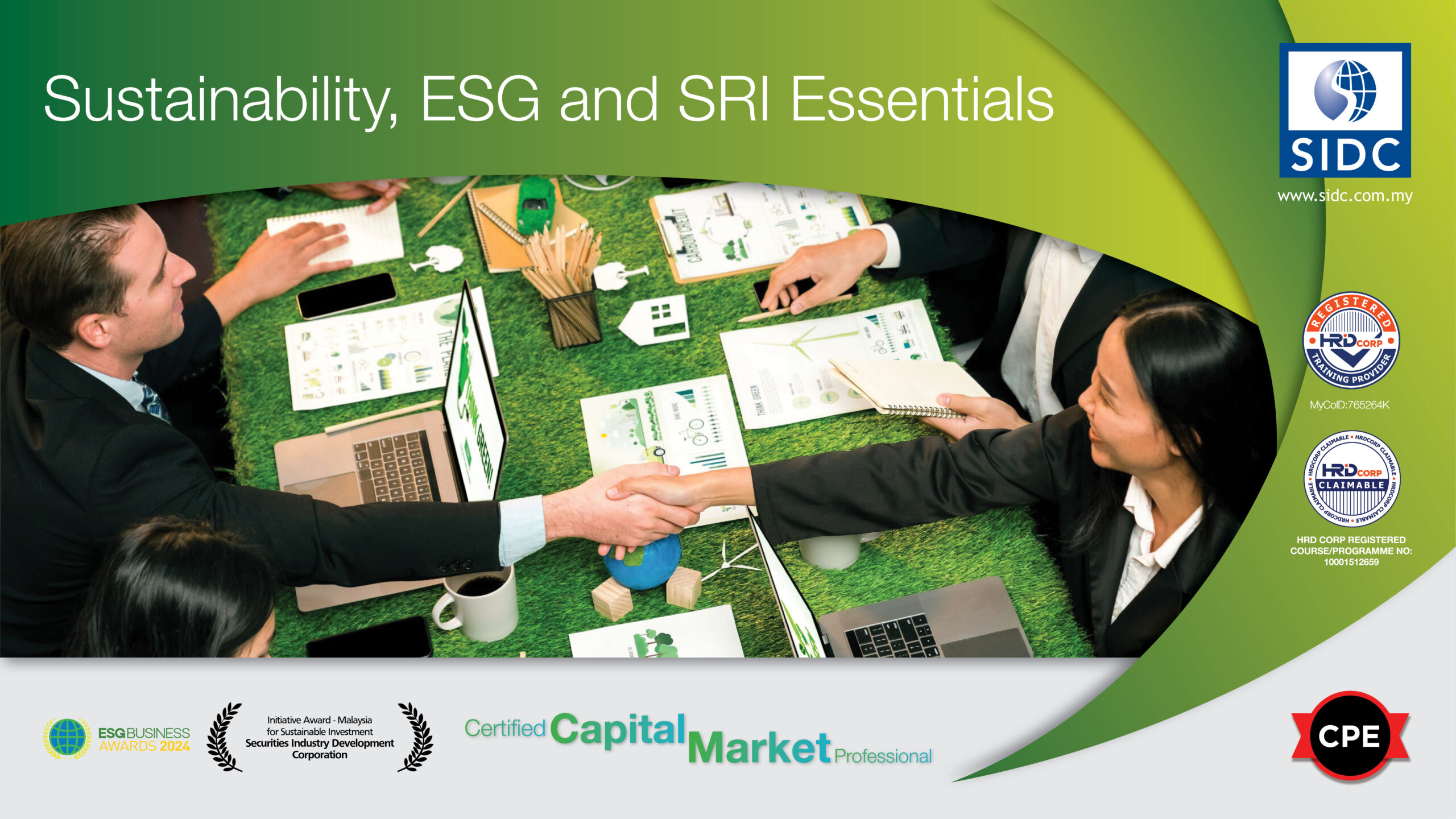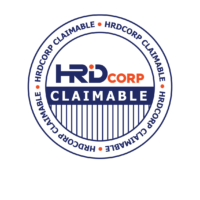



HRD Corp Registered Course/Programme No.: 10001512659
Sustainability, ESG and SRI Essentials (e-Learning) is your gateway to understanding how sustainability is reshaping business and finance. This programme equips you with the fundamentals of sustainability, ESG principles, and Sustainable and Responsible Investment (SRI) — covering global regulations, key standards, frameworks, and taxonomies. Whether you’re new to the field or looking to strengthen your knowledge, this course provides the practical insights needed to align strategies with the sustainability agenda and meet rising stakeholder expectations.
Programme Overview
Corporate sustainability has come a long way from the environmental concerns of the 1970s. Today, sustainability is a strategic business consideration driven by various market forces and encompasses environmental, social and governance issues. It poses opportunities and risks to businesses, and defines what growth needs to look like for a sustainable future. Stakeholders are driving this agenda, both as a minimum expectation for business continuity and as a market differentiator for increased competitiveness. This includes, among others:
- An exponentially increasing number of governments who are introducing environmental, social and governance (ESG) requirements and carbon pricing into law,
- Large companies who are relying on their global supply chains to reduce their carbon footprint and to mitigate labour practice risks, and
- Investors and financial institutions who are screening and stewarding key ESG considerations.
Professionals in all sectors and functions today are expected to understand, contribute to, and lead the sustainability pursuits of the company. There is no doubt that sustainability and sustainable finance presents a sharp learning curve, but the ability and speed to gain this understanding is a critical factor of success for companies today.
CCMP-SRI1 is a programme that provides this understanding of sustainability, ESG and sustainable and responsible investment (SRI) which is designed for research analysts, corporate finance advisers, investment product structurers, fund managers, compliance officers, aspiring sustainability analysts, risk managers, other professionals in the capital markets and financial services industry and those involved in investment and asset ownership decision making.
Programme Objective
This programme is designed to equip participants with deeper understanding of sustainability, ESG and SRI including concepts, global and regulation requirements, key standards, frameworks, taxonomy, risks, product structuring and the role and importance of sustainable and responsible investments.
Learning Outcomes
Upon completion of this e-learning, participants will be able to:
- Determine key sustainability factors, concepts, principles, strategies and methodologies to assess a corporate sustainability framework
- Apply SRI concepts, principles, strategies and methodologies to integrate and structure basic capital market products according to Malaysian regulatory requirements, established taxonomy, standards and best practices
- Conduct assessment of basic SRI products based on established methodologies, relevant data and criteria to determine compliance or alignment to Malaysian regulatory frameworks, established taxonomy, standards and best practices to advise on product recommendations
eLearning Modules Programme Outline
OVERVIEW
This e-learning programme consists of eight (8) modules covering the essentials of sustainability, environmental, social and governance (ESG) risks and integration and sustainable and responsible investment (SRI) product structuring.
OBJECTIVE
The e-learning programme is designed to equip and provide participants with an understanding on the fundamentals of sustainability, environmental, social and governance (ESG) and sustainable responsible investment (SRI), its concepts, regulatory environment, standards, frameworks, products, and risk.
LEARNING OUTCOMES
By the end of the e-learning programme, participants will be able to:
- Explain key sustainability concepts, principles, practices, regulatory requirements, common standards and best practice methodologies to be integrated into an organisation’s goals and strategy;
- Implement an organisation’s sustainability disclosure and reporting to drive business priorities, manage ESG risks, ensure regulatory compliance, and meet stakeholder expectations;
- Apply SRI concepts, principles and practices to structure capital market products that support economic, environmental, social and governance aspirations, and
- Assess capital market products on their alignment with sustainability principles, objectives, taxonomy and standards based on disclosed information and data.
| Module 1: Overview of Sustainability, ESG and SRI | |
| Recommended learning hours | 30 minutes |
| Overview | This module provides participants a view of the fundamentals of sustainability, ESG and SRI. As one of the fastest growing transformational corporate concepts in decades, sustainability is becoming a top agenda item of many stakeholder groups. This module defines sustainability and its components to support corporations and the financial sector in making this transition. |
| Objective | At the end of this module, participants will be able to:
|
| Topics | This module will cover the following:
|
| ICF |
|
| Module 2: Global and Local Sustainability Landscape and Adoption | |
| Recommended learning hours | 30 minutes |
| Overview | This module provides a view of sustainability developments globally and in Malaysia. It covers key concepts in the environmental, social and governance pillars. The module details a sustainability adoption methodology that can be employed by corporations for a structured transformation. |
| Objective | At the end of this module, participants will be able to:
|
| Topics | This module will cover:
|
| ICF |
|
| Module 3: Business Levers and Concepts in Sustainability | |
| Recommended learning hours | 30 minutes |
| Overview | This module provides a view of sustainability as a growth strategy; and a review of three opportunity levers for business planning considerations. These three levers can pose a threat or an opportunity and form the basis of the integration of sustainability into core business strategy. |
| Objective | At the end of this module, participants will be able to:
|
| Topics | This module will cover:
|
| ICF |
|
| Module 4: Global and Local Sustainability Regulations and Guidance | |
| Recommended learning hours | 30 minutes |
| Overview | This module provides a view of global and local regulations including the European Union (EU), the United States (US) and Malaysia, as well as a detailed review of disclosure guidance from Securities Commission Malaysia (SC), Bank Negara Malaysia (BNM) and Bursa Malaysia. |
| Objective | At the end of this module, participants will be able to:
|
| Topics | This module will cover:
|
| ICF |
|
| Module 5: ESG Measurement and Reporting | |
| Recommended learning hours | 30 minutes |
| Overview | This module provides a view of ESG data requirements, tracking, disclosure, evaluation and rating; and a detailed review of scoring by rating agencies. This will enable participants to make an informed decision on the selection, disclosure and evaluation of an organisation’s sustainability disclosures. |
| Objective | At the end of this module, participants will be able to:
|
| Topics | This module will cover:
|
| ICF |
|
| Module 6: ESG Risk Management | |
| Recommended learning hours | 30 minutes |
| Overview | This module provides a view of the significance of ESG risk globally and the relevant frameworks to leverage. It provides a general risk framework and discusses the implications of greenwashing. |
| Objective | At the end of this module, participants will be able to:
|
| Topics | This module will cover:
|
| ICF |
|
| Module 7: Overview of SRI Taxonomies | |
| Recommended learning hours | 30 minutes |
| Overview | This module provides a view of global and local SRI taxonomies and how they serve different parties in the alignment of commercial activities. It covers the different taxonomies and presents the underpinning principles. The module also provides guiding steps to help apply a chosen taxonomy. |
| Objective | At the end of this module, participants will be able to:
|
| Topics | This module will cover:
|
| ICF |
|
| Module 8: SRI and the Malaysian Capital Market | |
| Recommended learning hours | 30 minutes |
| Overview | This module provides a view of the varying structures of capital markets in Malaysia, the range of ESG investment approaches, the different types of products and the structuring process and considerations. |
| Objective | At the end of this module, participants will be able to:
|
| Topics | This module will cover:
|
| ICF |
|
PROGRAMME FEE AND REGISTRATION
Register to join Sustainability, ESG and SRI Essentials e-Learning Course anytime you want, at your own pace.
E-learning course is available throughout the year.
| PROGRAMME NAME | FEE (RM) | REGISTRATION LINK |
|---|---|---|
| Sustainability, ESG and SRI Essentials
(e-Learning) |
460.00 | Register Here |

